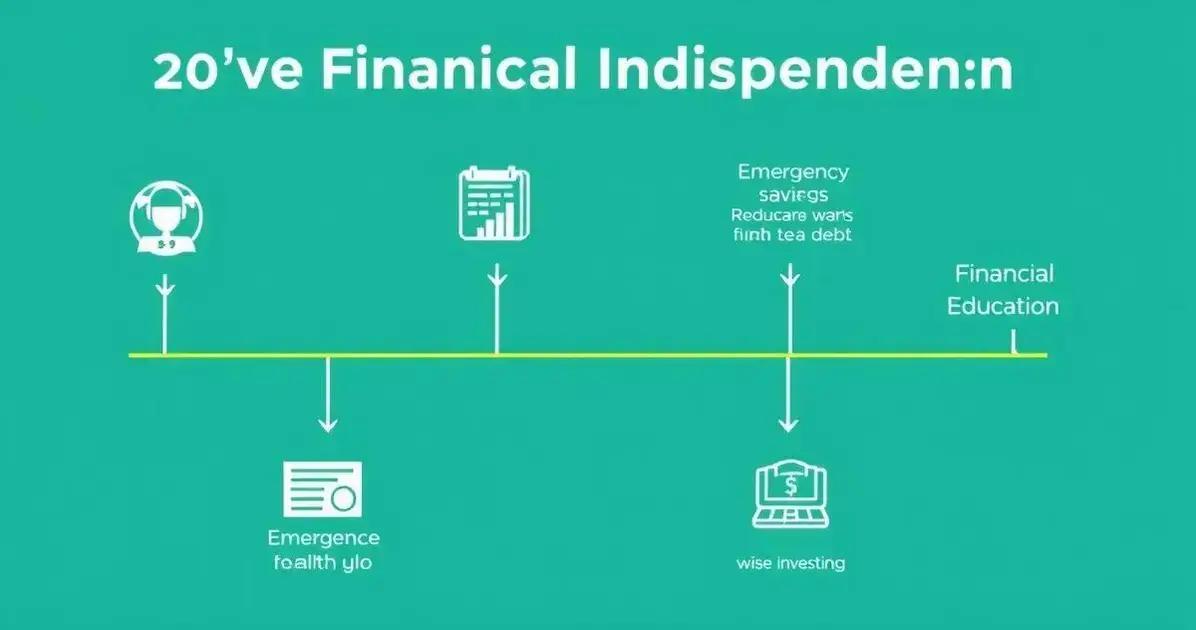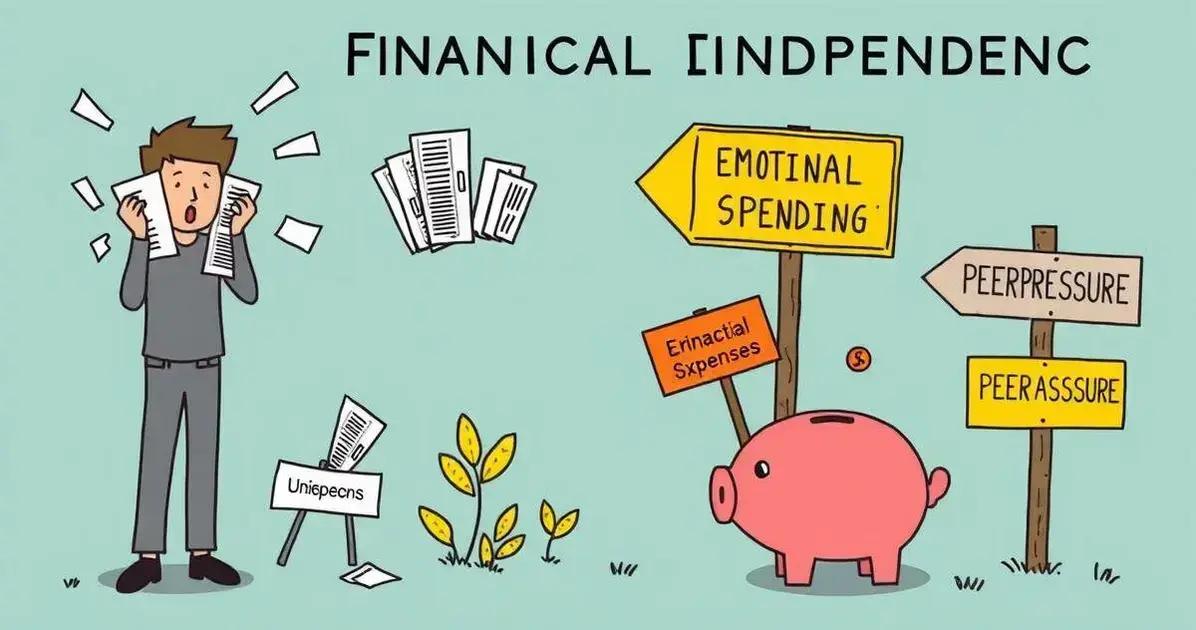Financial Independence: Unlocking the Secrets to a Wealthier Future Today
Advertising
Financial Independence is the state of having enough income from investments and savings to cover your living expenses without needing to work actively. Achieving it requires effective budgeting, smart investing, and overcoming challenges like debt and lifestyle inflation.
Understanding Financial Independence
Understanding Financial Independence is crucial for anyone who seeks to take control of their financial future. It means having enough savings and investments to live comfortably without working for a paycheck. Many people dream of this lifestyle, where they can choose how to spend their days without the pressure of a nine-to-five job.
What Does Financial Independence Mean?
Financial Independence is often defined by achieving a state where your investments generate enough income to cover your living expenses. This state allows you to have the freedom to make choices based on your desires, not your financial obligations.
Benefits of Being Financially Independent
One of the major benefits of achieving financial independence is the reduced stress that comes with financial security. You can explore activities or hobbies without the constraints of needing to earn money to keep up with expenses. Furthermore, being financially independent allows for a greater sense of personal freedom, enabling you to travel, start a business, or retire early if you choose.
How to Measure Financial Independence
The most common way to measure Financial Independence is by calculating your Financial Independence Ratio. This ratio reflects the amount of passive income you earn against your living expenses. When your passive income exceeds your monthly expenses, you are considered financially independent.
The Importance of Setting Goals
Setting financial goals is an essential step towards achieving Financial Independence. These goals guide your saving and investing strategies, helping you stay focused and motivated on your journey. Whether it’s saving for retirement, a dream home, or early travel plans, having specific goals can help you measure your progress and maintain your determination.
Steps to Achieve Financial Independence

Achieving Financial Independence requires a well-thought-out plan and commitment to specific steps. Here are some key steps to help you along your journey:
1. Set Clear Financial Goals
Start by defining what Financial Independence means for you. Set specific, measurable, achievable, relevant, and time-bound (SMART) goals. This could involve saving a certain amount of money or generating passive income through investments.
2. Create a Budget
A budget helps you track your income and expenses. By understanding where your money goes, you can identify areas where you can cut back. This will allow you to save more toward your financial goals.
3. Build an Emergency Fund
Financial security starts with safety. An emergency fund protects you from unexpected expenses, such as medical bills or job loss. Aim to save at least three to six months’ worth of living expenses in a separate account.
4. Reduce Debt
Paying off high-interest debt is crucial for Financial Independence. Focus on credit cards and loans that drain your resources. Consider strategies such as the snowball method or the avalanche method to manage debt effectively.
5. Invest Wisely
Investing is key to growing your wealth. Start early and take advantage of compound interest. Look into stocks, bonds, mutual funds, and real estate to diversify your investment portfolio and increase your chances of achieving financial independence.
6. Educate Yourself
Continuous learning about finances, investments, and personal budgeting is vital. Attend seminars, read books, and follow financial blogs to stay updated with new strategies and insights that can help you achieve your financial goals.
Tools and Resources for Financial Independence
To achieve Financial Independence, utilizing the right tools and resources can greatly enhance your journey. Here are some valuable options:
1. Budgeting Apps
Budgeting apps like Mint, YNAB (You Need A Budget), and EveryDollar help you track spending habits, set budgets, and monitor your financial health. These apps simplify budgeting by categorizing expenses and offering insights to improve your savings.
2. Investment Platforms
Investing is vital for building wealth. Platforms like Robinhood, Fidelity, and Betterment offer user-friendly options for buying stocks, ETFs, and other investment vehicles. These tools also provide educational resources to help you understand different investment strategies.
3. Financial Blogs and Podcasts
Learning from financial experts can provide you with valuable insights. Blogs like The Simple Dollar and Mr. Money Mustache, along with podcasts such as ChooseFI and The Dave Ramsey Show, cover topics related to budgeting, investing, and achieving financial freedom.
4. Personal Finance Books
Reading books on personal finance can give you a deeper understanding of money management. Some popular titles include Rich Dad Poor Dad by Robert Kiyosaki, The Total Money Makeover by Dave Ramsey, and Your Money or Your Life by Vicki Robin and Joe Dominguez.
5. Online Courses and Workshops
Consider taking online courses from platforms like Udemy or Coursera on personal finance, investing, and budgeting. These courses often provide structured learning and can help expand your knowledge on achieving Financial Independence.
6. Financial Advisors
If you’re unsure about managing your finances, hiring a financial advisor can be a smart choice. They can provide personalized advice based on your situation and help you create a plan tailored to your unique goals.
Challenges on the Journey to Financial Independence

On the path to Financial Independence, you may encounter various challenges that could hinder your progress. Understanding these challenges can help you navigate them more effectively.
1. Emotional Spending
One of the biggest challenges is emotional spending. Shopping can be a way to cope with stress or boredom. Being aware of your spending triggers is important. Create strategies to address emotional spending, such as finding alternative ways to deal with emotions or tracking your purchases.
2. Lack of Financial Knowledge
A lack of understanding regarding personal finance can impede your journey. Many people feel overwhelmed by budgeting, investing, and saving effectively. Use available resources like books, online courses, and financial blogs to increase your financial literacy.
3. Unexpected Expenses
Life is unpredictable, and unexpected expenses can arise at any moment. From medical emergencies to car repairs, these costs can derail your financial plans. Building an emergency fund is a crucial step to help manage these surprises without affecting your long-term goals.
4. High Debt Levels
Debt can be a significant roadblock to achieving Financial Independence. High-interest debts, such as credit card debts, can cause stress and prevent you from reaching your financial goals. Prioritize paying off debt by creating a repayment plan that suits your financial situation.
5. Peer Pressure and Lifestyle Inflation
As you work toward Financial Independence, you may face peer pressure to maintain a certain lifestyle. This can lead to lifestyle inflation, where you increase spending as your income rises. Stay focused on your goals and prioritize your needs over keeping up with others.
6. Inconsistency in Financial Habits
Staying consistent with your savings and investment strategies is essential. However, life events can shake your routine, causing you to stray from your financial plan. Regularly reassess and adjust your goals to keep yourself on track while implementing new habits.
In Conclusion: Your Path to Financial Independence
Achieving Financial Independence requires a combination of knowledge, discipline, and the right tools. By understanding what financial independence means and following clear steps, you can successfully navigate your journey.
Utilizing helpful tools and resources can streamline your efforts, while being aware of common challenges will prepare you to overcome obstacles along the way. Remember, financial independence is not just a destination but a journey that allows you to live life on your own terms.
Stay focused, keep learning, and remain committed to your goals, and you’ll unlock the secrets to a wealthier future.
FAQ – Frequently Asked Questions about Financial Independence
What is Financial Independence?
Financial Independence means having enough savings and investments to support your lifestyle without having to work for a paycheck.
What are the first steps to achieve Financial Independence?
Start by setting clear financial goals, creating a budget, and building an emergency fund to cover unexpected expenses.
What tools can help me on my journey to Financial Independence?
Tools such as budgeting apps, investment platforms, and educational resources like financial blogs and courses can greatly assist you.
What challenges might I face while pursuing Financial Independence?
You may face challenges such as emotional spending, unexpected expenses, high debt levels, and lifestyle inflation.
How do I stay motivated on my journey to Financial Independence?
Stay motivated by regularly reviewing your goals, celebrating small wins, and continuously educating yourself about personal finance.
Is Financial Independence achievable for everyone?
Yes, with proper planning, discipline, and dedication, Financial Independence is achievable for anyone, regardless of their current financial situation.




